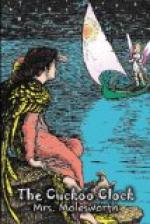“I knew a little girl once,” pursued Miss Grizzel, “who was quite of opinion the cuckoo was alive, and nothing would have persuaded her it was not. Finish your breakfast, my dear, and then if you like you shall come with me and see the cuckoo for yourself.”
“Thank you, Aunt Grizzel,” said Griselda, going on with her bread and milk.
“Yes,” said Miss Tabitha, “you shall see the cuckoo for yourself.”
“Thank you, Aunt Tabitha,” said Griselda. It was rather a bother to have always to say “thank you,” or “no, thank you,” twice, but Griselda thought it was polite to do so, as Aunt Tabitha always repeated everything that Aunt Grizzel said. It wouldn’t have mattered so much if Aunt Tabitha had said it at once after Miss Grizzel, but as she generally made a little pause between, it was sometimes rather awkward. But of course it was better to say “thank you” or “no, thank you” twice over than to hurt Aunt Tabitha’s feelings.
After breakfast Aunt Grizzel was as good as her word. She took Griselda through several of the rooms in the house, pointing out all the curiosities, and telling all the histories of the rooms and their contents; and Griselda liked to listen, only in every room they came to, she wondered when they would get to the room where lived the cuckoo.
Aunt Tabitha did not come with them, for she was rather rheumatic. On the whole, Griselda was not sorry. It would have taken such a very long time, you see, to have had all the histories twice over, and possibly, if Griselda had got tired, she might have forgotten about the “thank you’s” or “no, thank you’s” twice over.
The old house looked quite as queer and quaint by daylight as it had seemed the evening before; almost more so indeed, for the view from the windows added to the sweet, odd “old-fashionedness” of everything.
“We have beautiful roses in summer,” observed Miss Grizzel, catching sight of the direction in which the child’s eyes were wandering.
“I wish it was summer. I do love summer,” said Griselda. “But there is a very rosy scent in the rooms even now, Aunt Grizzel, though it is winter, or nearly winter.”
Miss Grizzel looked pleased.
“My pot-pourri,” she explained.
They were just then standing in what she called the “great saloon,” a handsome old room, furnished with gold-and-white chairs, that must once have been brilliant, and faded yellow damask hangings. A feeling of awe had crept over Griselda as they entered this ancient drawing-room. What grand parties there must have been in it long ago! But as for dancing in it now—dancing, or laughing, or chattering—such a thing was quite impossible to imagine!
Miss Grizzel crossed the room to where stood in one corner a marvellous Chinese cabinet, all black and gold and carving. It was made in the shape of a temple, or a palace—Griselda was not sure which. Any way, it was very delicious and wonderful. At the door stood, one on each side, two solemn mandarins; or, to speak more correctly, perhaps I should say, a mandarin and his wife, for the right-hand figure was evidently intended to be a lady.




